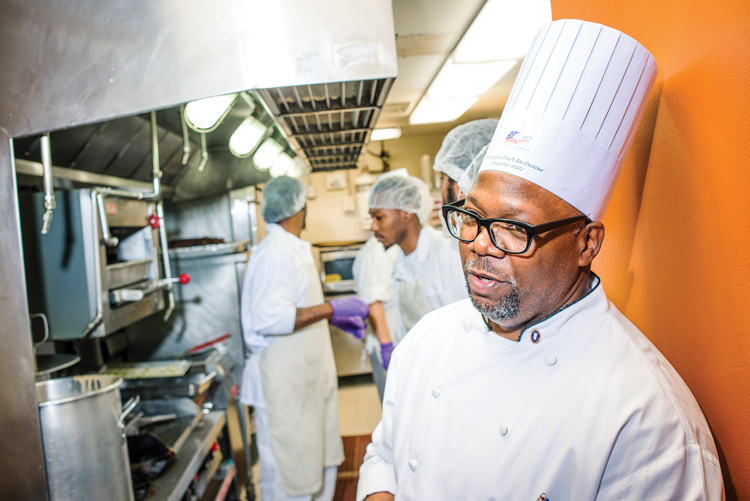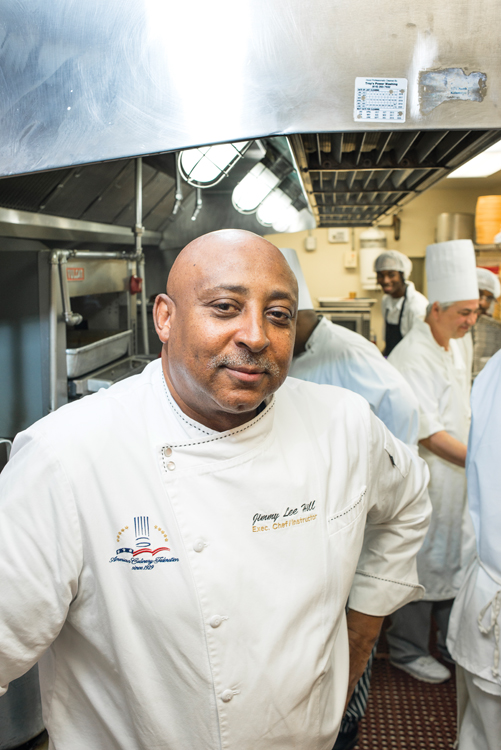
Ernest Davis
For some prisoners at Coldwater’s Lakeland Correctional Facility in southwest Michigan, they live in two worlds. On one side of the yard, there’s the prison where they spend most of their days. Inmate No. 179886, otherwise known as Ernest Davis, starts his day with prayer and meditation, followed by exercise in the prison yard. Later he’ll read, prepare lunch, and hang out “unless I’m stressing about something.”
But his mind never strays far from his strongest passion: food. Across the yard and beyond the fence topped with razor wire is the administration building, which houses the food technology room. Every second and fourth Thursday, the space is transformed into the Saffron Café for prison staff and visitors to dine in.
Here, Davis isn’t just inmate No. 179886. He’s Sous-Chef Davis.
“When I am in the classroom and especially in the kitchen I feel free,” says Davis, 49, who was sentenced in 1984 at age 17 to life after being convicted of aiding and abetting a murder. He’s been a sous-chef (typically a chef’s right-hand man) since 2012 and is also a classroom tutor. “I become creative and focused on creating great food and/or passing down the gift in which was entrusted to me, the art of preparing fine cuisine.”

In this kitchen, under the guidance of executive chef/instructor Jimmy Hill, Davis and fellow prisoners learn more than food costs or proper sanitation. They also learn discipline, respect, and leadership. It’s also helping inmates change the way they see themselves. Several prisoners say the program has given them a sense of purpose — and for those who serve their time and leave Lakeland, a second chance of making a life for themselves on the outside.
But society can be unforgiving to those with criminal records.
“So often (ex-prisoners) are neglected and overlooked because of who we are and where we are at, regardless of our talents or what we may be able to offer society,” Davis says.
Difficulty finding a job is just one factor in recidivism, the rate at which former prisoners return to prison. According to the U.S. Bureau of Justice Statistics, studies have found high rates of recidivism among released prisoners. One study tracked 404,638 prisoners in 30 states after their release in 2005. Within three years of release, 68 percent were rearrested, and within five years about 77 percent were rearrested.
Tony Costello, assistant education manager for the Michigan Department of Corrections and principal for the education program at the Lakeland Correctional Facility, says studies show education in prison can help reduce recidivism. According to a report by the RAND Corp., inmates who participated in a correctional education program had a 43 percent lower chance of recidivism.
At Lakeland, academic courses are required for prisoners who enter prison without a GED or high school diploma. Vocational classes are required for every prisoner depending on their work history, Costello says.
On an average day, there are 6,200 prisoners enrolled in academic and vocational education in 31 schools, Costello says. In the corrections system, there are 11 food technology programs statewide. The standard curriculum offers certifications in ProStart, which is typically offered to high school culinary students; ServSafe, which covers food safety; and START (Skills, Tasks, and Results Training), which focuses on hospitality.
MDOC also offers employment readiness training for prisoners before they go home, and its re-entry section works with Michigan Works and potential employers to help with job placement upon release.
No Prejudice with Food
The food industry is known for being generous with second chances.
“Food doesn’t have any prejudice,” says Terrance Wallace, who participated in the food technology program when he was incarcerated from 2004-07. “If you put up a good plate and it tastes good, someone wants to know who made that” and they don’t care what their race is. Or if they were a former prisoner.
Wallace never forgot the advice executive chef Hill gave him: “You’re going to hear a lot of ‘noes’ but the ‘yeses’ you hear you better take full advantage.”
After he got out of prison, Wallace enrolled in culinary school and worked his way up through the ranks, even when some employers were wary of putting him in chef positions because of his record.
Eventually the noes were replaced with yeses. Wallace was an executive sous-chef the Montauk Yacht Club in New York, and he recently accepted a job as executive chef of a resort in St. Thomas in the Virgin Islands.
 “There needs to be more programs like (Lakeland),” Wallace says. “I’ve been in places in prison that don’t have programs and guys have nothing to do other than fight and smash each other and plan their next crime. … Some guys have a lot of talent, but they just don’t have anyone to open that door to give them the opportunity. There’s no telling where I could’ve been … (in prison) I could’ve plotted my next crime.” But at Lakeland, he says, “I plotted my next career.”
“There needs to be more programs like (Lakeland),” Wallace says. “I’ve been in places in prison that don’t have programs and guys have nothing to do other than fight and smash each other and plan their next crime. … Some guys have a lot of talent, but they just don’t have anyone to open that door to give them the opportunity. There’s no telling where I could’ve been … (in prison) I could’ve plotted my next crime.” But at Lakeland, he says, “I plotted my next career.”
Zajuan Nenrod, aka Daqwan Sistrunk, from Detroit already has his culinary tagline down: southern roots mixed with five-star flair. Serving a seven-year sentence on a drug conviction and slated for a 2018 release, he wants to be an executive chef.
Before prison, he learned how to cook from his grandmothers and helped his mom run a carryout restaurant in Detroit, but it was Hill who “taught me how to cook,” he says.
Others wait anxiously for the chance to be released so they can put their new skills to use. Gary Baublitz, 53, is serving a life sentence after pleading guilty to second-degree murder in the 1981 slaying of his father as part of a murder for hire plot. At the time, he was a juvenile. As he retells his story to a writer, he is overcome with emotion, still haunted by choices he made 35 years ago. He is hopeful. “I have the ability to be reviewed for parole by the parole board,” says Baublitz, who has been given a date of September 2017. If he gets out, he wants to own a family restaurant.
When he started the program, “I didn’t have a clue,” he says. Now he is garde manger, French for “keeper of the food.” He oversees the execution of hors d’oeuvres, pates, and terrines (typically a French forcemeat loaf named after the dish it’s prepared in).
Lakeland’s culinary program can be done in as little as a few months or it can take up to a year. Sixty prisoners are on the waiting list, Hill says. There are 25 students each in the morning and afternoon sessions. Students must have a high school diploma or GED and be able to read at an eighth-grade level.
Hill also brings in guest chefs, such as James Rigato, the chef at Hazel Park’s Mabel Gray, to speak as well as have prisoners compete against each other in cooking contests to test their skills.
After working in the corrections system for 31 years and 27 years as the executive chef/instructor, Hill loves his job, even if it means a round-trip of more than 130 miles for him to commute to Coldwater from Lansing every day.
“It is so gratifying to see the guys’ faces when they complete a project like making cookies or a cake for the first time and then going from that to learning how to make a mother sauce, preparing an entrée, and finally a full meal. The pride that they take in and/or show when we’re preparing and serving the meals on Thursdays is unbelievable … I’ve worked with some experienced kitchen staff in restaurants that’s less motivated and are only there for the money but the joy of the accomplishment by these guys, is amazing.”
He’s empowered the prisoners to be leaders, as well, even those who are locked up for life.
Charles Ralston, who split his time between Lapeer and metro Detroit growing up, is serving a life sentence, convicted of felony murder in 2003. Like Davis, he is a sous-chef and a tutor. The 51-year-old hopes to set an example for younger inmates.
“I hope what I do in here will save someone out there,” he says.
Respect is also earned. While a writer speaks with Anthony Johnson, several staffers pass by the interview room and their conversation is regularly interrupted as Johnson exchanges greetings with passersby as they wave at him and greet him by his nickname, “Bear.” There’s a gap between staff and prisoners, he says, but it’s “shortened when you show you want to excel.”
Johnson received a life sentence in 1977 on charges of second-degree murder in the fatal shooting of a Benton Harbor grocer. In the 40-plus years he’s been behind bars, he discovered he had a talent for baking; chocolates are his specialty.
“Things I used to think were important changed when I took an interest in the culinary arts,” he says. The program “changed my attitude and whole outlook.” He’s been eligible for parole since 1985. But after a judge rejected the parole board’s decision to grant him a hearing for parole, he says, “I’m stuck.”
 A New Life Beyond Bars
A New Life Beyond Bars
The holiday meal in December is the biggest one of the year. Wearing a T-shirt that says “Chef,” Hill walks around the room as he checks in with students preparing prime rib, lobster bisque, and mussels in basil coconut sauce for their guests.
But as service nears and the chef coat comes on, Hill’s relaxed demeanor transforms into a fierce intensity as he tastes sauces for seasoning and checks mashed potatoes for consistency.
For the next couple of hours, the restaurant is a flurry of activity. Ralston sets up an abundant appetizer buffet that features pickles he made using the garden’s bounty; he got the inspiration from the legendary but now-closed Carl’s Chophouse, he explains, as he proudly shows off pickled watermelon and beets before heading back into the kitchen to tend to the fish and shrimp. Johnson leads the team of bakers, precisely weighing pieces of dough. Davis has his hand in everything, and improvises when a guest says she’s vegetarian. He sautés spinach, peppers, and onions and sprinkles Parmesan on top.
This year’s holiday dinner may be Davis’ last. A settlement conference hearing is set for Jan. 30 and if things go his way, he may be able to walk out a free man after decades of being locked up.
He has a lot of plans, such as working with his son, who is a chef. Davis would send him recipes when he was in high school after the younger Davis would complain about being in home economics with only one other boy and the rest were girls.
“I then asked him, did he know what his father did in prison? Then I explained to him that being a chef was extremely cool and the job to have in the future,” Davis says.
Davis is ready for his own future. “Wish me luck because a brother is really ready to get out of this place and start a new life beyond bars,” Davis says.
|
|
|









